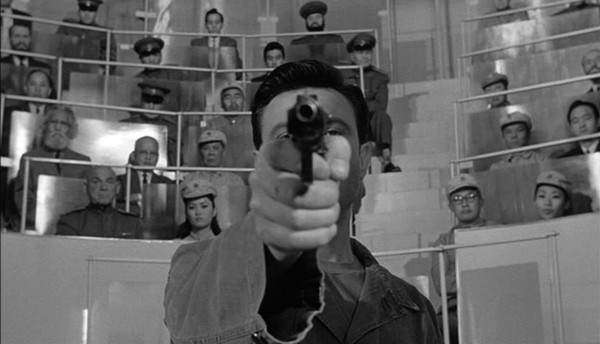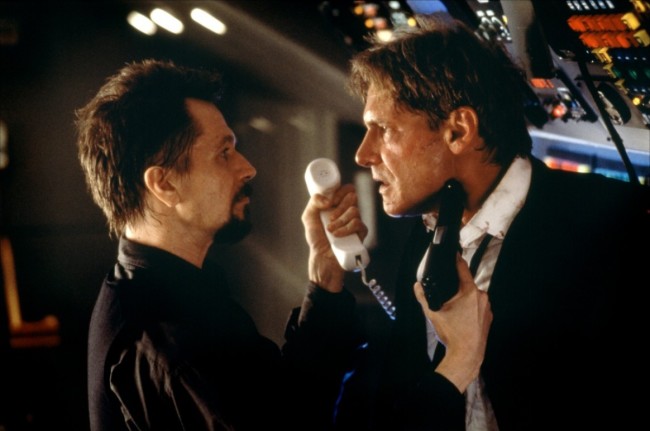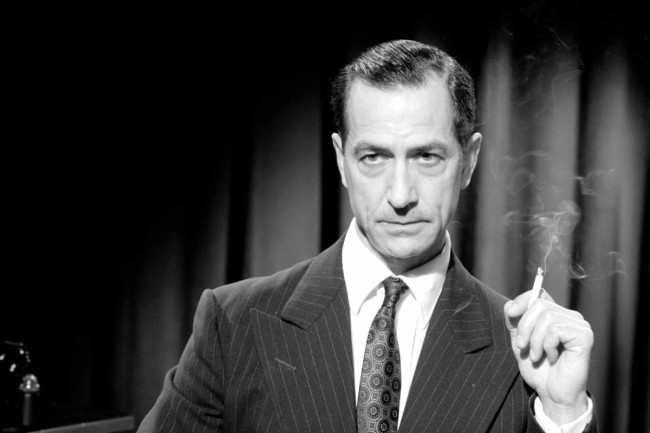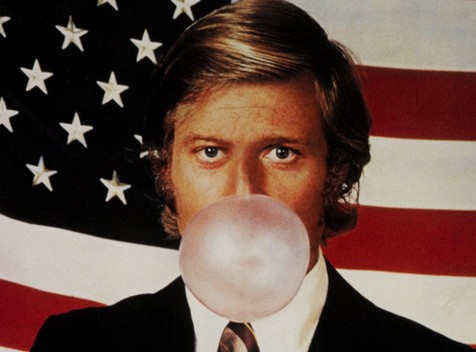In what will come as a surprise to nobody, we have an election coming up in November. My job as a sarcastic, trivia-obsessed, film critic does not put me in a position to tell anyone who to vote for. But as an American citizen, I figure it is my duty to tell you to vote. There are more than two political parties in this country, so it is likely that there is one that fits your political ideals. Even if there is not, read up on all of the local issues on your ballot, the men and women running for office in your city and state deserve a look too. If you don’t vote, you can’t complain about the government that gets elected. That’s enough of a civics lecture, it’s time for some great movies about politics.
All the President’s Men (1976)
Of all the movies about the Washington Post uncovering a scandal involving a president and a bumbling bunch of his underlings, this is by far the best. I know, it’s a short list, but Bob Woodward and Carl Bernstein (Robert Redford and Dustin Hoffman, both amazing) dig up the Watergate scandal and take down President Richard Nixon. Far and away Alan J.Pakula’s best movie.
My Fellow Americans (1996)
Former presidents Kramer and Douglas (Jack Lemmon and James Garner) are forced to become reluctant allies after they become targets. President Haney’s (Dan Aykroyd) administration is hiding something and they need to make sure the former leaders of the free world don’t expose the cover-up. There’s everything a movie needs: Attempted murder, a cross country chase, Sela Ward, an Elvis impersonator, a dancing Panda and a gay pride parade. There’s also plenty of coarse, funny dialogue between Garner and Lemmon.
Mr. Smith Goes to Washington (1939)
Frank Capra is one of my favorite directors. His movies always seemed to shake their pudgy fist at the powers that be and argued in favor of the little guy. Some film scholars dismiss Capra’s work as too feel-good, too populist, too simplistic and idealistic. I call these people morons. From start to finish, Mr. Smith is a well-paced story of an idealistic young man (James Stewart) appointed to a vacant U.S. Senate seat. His grand plans for a better America slams up against intrenched political corruption. Sure, the plot of the movie is exactly what detractors have always said about Capra’s films. It also captures more hope and love for America that could only be filmed by an immigrant who grew up poor, only to find success beyond his wildest dreams. There’s also a filibuster that adds dramatic tension and makes the payoff worth investing in and watching to the grand finish.

Much better than the remake
The Manchurian Candidate (1962)
Raymond Shaw (Laurence Harvey) is a former Korean War POW who has been brainwashed by Communists into becoming a political assassin. His former commander, Major Ben Marco speaks by rote whenever he is asked his opinion. “Raymond Shaw is the kindest, bravest, warmest, most wonderful human being I’ve ever known in my life.” Marco was brainwashed too. Gradually, his whole unit is having nightmares and flashbacks that reveal the horrors of war. Frank Sinatra and Janet Leigh are brilliant, but Angela Lansbury got an Oscar nomination for her performance. It’s a tightly-wound piece of Cold War paranoia with great camera angles and plenty of hand-held shots to further disorient the viewer. John Frankenheimer is at the top of his game and the script by George Axelrod is a flawless interpretation of the novel by Richard Condon.
The American President (1995)
Sydney Ellen Wade (Annette Bening at her most beautiful) is a lobbyist who falls for the widowed president (Michael Douglas looking presidential) after he asks her out on a date. There is something adorable about a widowed president getting dating advice from his daughter (“compliment her shoes, girls like that.”), and something amusing about the White House staff trying to figure out the Virginia state flower. If you’re looking for a romantic political movie with a liberal slant, this is the film for you. Richard Dreyfuss is amusing as the bloviating opposition. Martin Sheen, Michael J. Fox and Samantha Mathis are solid in Rob Reiner’s well-paced, but not subtle, film. Aaron Sorkin wrote the screenplay, so there is plenty of walking and talking.
Being There (1979)
Hal Ashby directed Peter Sellers as a simple gardener who is mistaken for something he is not and ends up the confidant of a powerful business mogul and a Washington insider. It’s a well-crafted story of the meek inheriting the Earth, sort of. Sellers lends an honesty to Chance the Gardener, who is re-dubbed Chauncy Gardner, never loses his refreshingly direct answers. The only downside is the fact that all of Chance’s knowledge comes from what he learned watching television.
Dave (1993)
The president falls into a coma and a look-alike (Kevin Kline) is brought in to dupe the American people while the bad guys in the back room make the deals. Sigourney Weaver is the First Lady and she may or may not know what’s going on, since the couple has had zero romantic chemistry in ages. It’s an Ivan Reitman film, so there are funny bits and feel-good moments too. It’s also well-made and never dull.
Suddenly (1954)
In the town of Suddenly, sheriff Tod Shaw is woefully bad at his attempts to woo local widow Ellen Benson, a pacifist who can’t abide guns or those who use them. She is in for a hellish day when an assassin takes over her home intent on killing the president when his train passes through town. Frank Sinatra is brilliant as the assassin and the black and white imagery is simple and brilliant.

Gary Oldman, cinema’s once favorite baddie.
Air Force One (1997)
The President of the United States (Harrison Ford) gives a stirring speech in Moscow announcing to the world that the U.S. now has a “Zero-Tolerance” policy with regards to terrorism. Of course, it’s not long before terrorists take over Air Force One and hold the president, his family, and plenty of his staff hostage before demanding the release of a radical leader. In the hands of director Wolfgang Petersen — the man behind the epic “Das Boot” — the sense of claustrophobia and drama is everywhere. Gary Oldman captures ruthless devotion to a cause and his accent is flawless. Ford is very presidential and also a bit of an ass-kicker. There’s talky dramatic scenes on the ground with Glenn Close as the Vice President in a no-win situation, and there is well-crafted, brilliantly filmed action in the skies above some soviet breakaway republic. Between scenes, Oldman would not stay in character, instead he would be engaging and joke with the other cast members. Petersen apparently loved filming the movie to the point he referred to it as “Air Force Fun,” and brain-stormed with Ford over a weekend to come up with a different ending from the original. At the last minute, he also scrapped Randy Newman’s score. Newman ended up using parts of his work in “Toy Story 3.”
Frost/Nixon (2008)
Ron Howard’s dramatic retelling of the post-Watergate television interviews between British talk-show host David Frost and former president Richard Nixon. Well-made, solid if sometimes slow-paced, the film is practically a time capsule of an era when a former president unraveled on camera. With Frank Langella, Michael Sheen, Kevin Bacon and Sam Rockwell.
Seven Days in May (1964)
Fearing a sneak attack from the Soviets, the United States military leaders plot to overthrow the President when he supports a nuclear disarmament treaty. A taut thriller with a solid near-perfect cast. Burt Lancaster, Kirk Douglas, Ava Gardner and Martin Balsam are all incredible. During the cold war, John Frankenheimer was the master of paranoid films. With a screenplay by Rod Serling, the total package is nothing short of amazing.
The Enemy Within (1994)
A worthy remake of the above mentioned film. Forest Whitaker, Sam Waterston and Dana Delany are all believable and the tension is palpable. An updated scenario to reflect the same tensions in a different era. The end result is another tense thriller.

A monochrome and steely David Strathairn
Good Night, and Good Luck (2005)
CBS journalist Edward R. Murrow stood up to U.S. senator Joseph McCarthy when nobody else would. McCarthy ruined lives in his quest for power and desire to rid the U.S. of communists, real or imagined. George Clooney directs and David Strathairn nails the ever-serious Murrow. At the apex of the Red Scare, Murrow unloaded a truth bomb on the American television audience.
In a cigarette-fueled takedown, Murrow stares into the camera and unloads: “‘The fault, dear Brutus, is not in our stars, but in ourselves.’ No one familiar with the history of this country can deny that Congressional committees are useful. It is necessary to investigate before legislating, but the line between investigating and persecuting is a very fine one, and the junior Senator from Wisconsin has stepped over it repeatedly. We must not confuse dissent with disloyalty. We must remember always that accusation is not proof and that conviction depends upon evidence and due process of law. We walk not in fear, one or another. We will not be driven by fear into an age of unreason if we dig deep in our history and doctrine, and remember that we are not descended from fearful men, not from men who feared to write, to associate, to speak and to defend the causes that were for the moment unpopular. This is no time for men who oppose Senator McCarthy’s methods to keep silent, or for those who approve. We can deny our heritage and our history, but we cannot escape responsibility for the results. We proclaim ourselves, indeed as we are, the defenders of freedom wherever it continues to exist in the world, but we cannot defend freedom abroad by deserting it at home. The actions of the junior senator from Wisconsin have caused alarm and dismay amongst our allies abroad and given considerable comfort to our enemies. And whose fault is that? Not really his. He didn’t create this situation of fear, he merely exploited it, and rather successfully. Cassius was right. ‘The fault, dear Brutus, is not in our stars, but in ourselves.'”
In the wake of Donald Trump’s presidential bid, some lessons are worth remembering. This is one of them.
Fail-Safe (1964)
Sidney Lumet’s direction is spot-on. Perhaps the only time he is better is “Twelve Angry Men.” It’s an anti-war film that tells the tale of what happens when U.S. planes are accidentally sent to nuke Moscow. Can the world be saved? Henry Fonda, Walter Matthau, Fritz Weaver and Dan O’Herlihy star in this Cold War gem. Seeing Fonda on the phone, trying to reason with the Soviets is a classic moment of filmmaking.
JFK (1991)
This epic mess of a film was directed by Oliver Stone, who actually did some very watchable films. A long time ago, I reviewed the season premiere of the TV show “Quantum Leap” where Scott Bakula lept into the body of Lee Harvey Oswald. I said then that that may have been the only angle Stone missed in his everybody-done-it “JFK.” I stand by that review to this day.
Nixon (1995)
A much better movie by Oliver Stone. It covers the arc of Richard Nixon from a young boy to adulthood and the presidency of the United States. Almost everyone knows how his story ended in epic shame and disgrace. Here you get to learn a little about the man who was more than the scandal that brought him down.

Redford in the classic promotional materials
The Candidate (1972)
Robert Redford is Bill McKay a candidate for U.S. Senate seat from California. His odds of winning are slimmer than slim to none. This film is notable for featuring Groucho Marx’s last film role, not to mention a great performance by Redford. James Stewart was offered the role of Senator Crocker Jarmon, but turned it down because he thought it was a negative portrayal of conservative politicians. Stewart was correct, Jarmon was not a likable character. Peter Boyle is note perfect in the role of McKay’s campaign manager. It is a great story about what happens when someone young and idealistic gets swallowed by a political machine.
The Best Man (1964)
A well-written, but thinly disguised critique by Gore Vidal. “The Best Man” is one of very few political movies that is a must-see. Henry Fonda stars as presidential hopeful William Russell, clearly a stand-in for perennial candidate Adlai Stevenson. Fonda bares more than a passing resemblance for Stevenson. The part of Joe Cantwell is played by Cliff Robertson, the doppelganger of Richard Nixon. The two candidates vie for the endorsement of an ex-president in this morality play of politics in the 1960-64 era. Much of it still rings true today. Also, in the worthless trivia department: Ronald Reagan was turned down for a role, because it was felt he did not look ”presidential.”
Wag The Dog (1997)
Barry Levinson directs Dustin Hoffman, Robert DeNiro, Anne Heche and Dennis Leary in this tale of a spin doctor and a Hollywood producer fabricate a war to cover up a scandal.
Thirteen Days (2000)
I read a review describing this movie as “White guys in black suits.” While accurate, it is not completely correct. Kevin Costner and a bunch of other white guys reenact the Kennedy administration’s dilemma and struggles during the Cuban Missile Crisis. There’s a lot of talking going on, but there is dramatic tension as well. So yes, there’s white guys, there’s black suits and skinny ties, but there is also palpable drama and armageddon as a possible outcome.
A Face in the Crowd (1957)
Andy Griffith is an American treasure. He is much beloved for his folksy charm, his loyalty to friends and cast members throughout his life. All of that lovable charm is out the window in Elia Kazan’s amazing “A Face in the Crowd.” Griffith is Lonesome Rhodes, a lazy, opinionated, womanizing drunkard who gets discovered passed out on the floor of an Arkansas jail and rises in fame. With fame and fortune comes political power. A billionaire uses Rhodes to sway a presidential election. Screenwriter Budd Schulberg came up with a brilliant, gripping script that builds tension throughout. It foretold the future of a media personality getting drunk on his/her own power.
